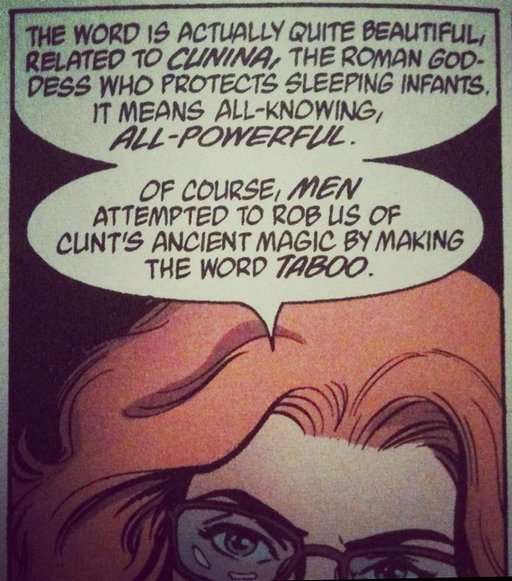November 23rd, 2014 -- by Bacchus
Stealing That Ancient Cunt-Magic

According to Charlie who tweeted it, this is a panel from a comic book series called Y – The Last man.
Similar Sex Blogging:
This entry was posted on Sunday, November 23rd, 2014 at 12:34 pm. You can follow any responses to this entry through the RSS 2.0 feed. You can leave a response, or trackback from your own site.
Shorter URL for sharing: https://www.erosblog.com/?p=12851
Shorter URL for sharing: https://www.erosblog.com/?p=12851








I would like to see a credible etymology for this assertion. I looked at a number of references and could not find “cunina” as a source. The Latin “cunnus” was in use by many Romans. It referred to the pudenda.
Cunina is listed as the goddess of sleeping children, but I see no link to an evolution of this word to the familiar Germanic term “cunt”.
This seems to be folk etymology. Evidence may be out there, but I cannot find it.
Well, it’s not surprising to find folk etymology in a comic book, is it?
That said, I have heard this particular bit of folk etymology before, so I don’t think this comic book writer made it up. Like a lot of folk etymologies, it’s a meme that’s out there.
It seems, from several sources, that this quote was found in one of the first five issues of Y: The Last Man published at the end of 2002, collected into one trade paperback in 2003. So, plenty of time for the folked-up etymology to spread. Do you know of any cases that can be dated to before that?
Cunae is the Latin word for cradle (the plural form in this case used for a singular object, like trousers). Cunina was another minor goddess named after her job.
The punning with cunning is quite venerable, though, from at least 750 years ago. Quoted from the OED
a1325 (▸c1250) Prov. Hendyng (Cambr.) xlii, in Anglia (1881) 4 190 Ȝeue þi cunte to cunnig, And crave affetir wedding.
Give your cunt with cunning
And demand after wedding.
I must grow some more cuntmint but I find cuntwort an ugly plant out of its natural habitat.
I feel like this goddess-connected etymology is something I first saw in the context of 1970s radical feminist writings, but I don’t have a concrete memory, or a citation.